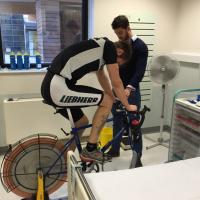
Ed Gray
@edwardagray
PhD candidate at Western Sydney Uni. Interested in nutrition and metabolism. MSci at Uni of Bath with WAIS placement. Keen cyclist. Sometimes found running.
ID: 3995525308
19-10-2015 15:46:12
97 Tweet
101 Followers
222 Following

A sensible update on carbohydrate loading - is it still a thing? by Christie Aschwanden From history to contemporary thoughts - thanks for the interview (and your homework!). elemental.medium.com/is-carbo-loadi…


Great new insights into low CHO training using a delayed CHO feeding strategy from Tim Podlogar Gareth Wallis. Raises the question: what is important to promote typical low CHO training adaptations? NEFA, IMTG use, low muscle glycogen alone, or other? tandfonline.com/doi/full/10.10…

Previous research found CHO ingestion to improve short (<1h) performance. Surprisingly, ncbi.nlm.nih.gov/pubmed/15354036 found CHO infusion didn't improve 1h performance. This led to the discovery of the non-metabolic, ergogenic effect of CHO sensing in the mouth (ncbi.nlm.nih.gov/pubmed/15570147)

Extensive research has previously investigated the type and amount of CHO to ingest during endurance exercise. Excellent, ambitious project by Campbell Menzies and others explores the sparsely researched area of CHO ingestion timing. Take home: +ve effects of frequent feeding.


Warm bath after exercise does not ⬆️ MPS Our newest paper online in Journal of Applied Physiology: "Hot-water immersion does not increase post-prandial muscle protein synthesis rates during recovery from resistance-type exercise in healthy, young males". journals.physiology.org/doi/pdf/10.115…


During this #COVID19 pandemic we are unable to eat out, but you can still order Domino's Pizza If you have ever wondered what happens to your body when you eat dominos, read on... Here I present, ‘The physiological responses to maximal eating in men’ doi.org/10.1017/S00071…


